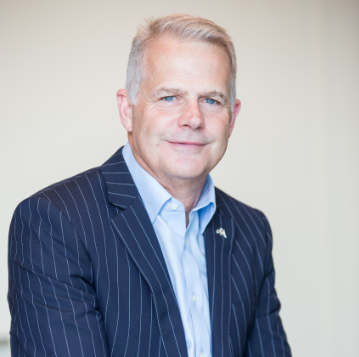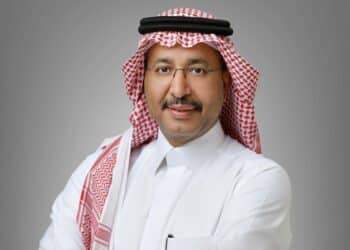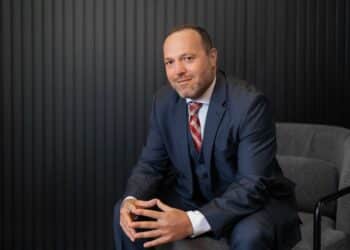Having unified JA Hotels and Resorts from a collection of hotels into a high performing leisure brand, JA Resorts and Hotels COO David Thomson is now on a mission to reinvent the family holiday and take a greater share of the $140bn family holiday industry.
JA Resorts and Hotels has recently opened a number of highly anticipated properties in the Indian Ocean. How are these performing currently?

Things are good. We are doing very solid occupancies, averaging mid-70s in both properties and we are very pleased. In a 10 bed property that is quite an achievement, as it is difficult to keep occupancies up in that property type.
What we have also seen, and this is an issue worldwide, is that average rates have taken a dip. JA Manafaru, isn’t quite where we wanted it to be now because the competitive set against which it was benchmarked has dropped, so we have been obliged to go with that.
But both Enchanted Island and JA Manafaru are doing well with rave reviews from guests, tour operators and our key partners. JA Manafaru has surprised people because it’s right up there alongside the top resorts in the Maldives and what we offer there for children and families it doing well.
I have recently travelled to Russia, China and the UK and all of them are really blown away by the product and we are delighted by that.
In addition you have also managed to position the Maldives property as a family destination, which isn’t a traditional concept for the island. Why and how was that decision taken?
I was actually on a panel at World Travel Market in London in November 2015, with Worldwide Kids talking about the importance of family tourism in driving up average rates. It was a very interesting topic and essentially we concluded that whatever you do “for kids” is actually for kids and not just to tick boxes.
Don’t call Teen Clubs “teen clubs”, just provide the facilities and a place teenagers want, for them to socialize and engage. The name Chill Out Zone for example, is now a thing of the past. I mean you couldn’t get my teenage children into a “teen club”, so why do we have them?
Following that, we took a company decision to drop that label. Instead, we have fabulous games rooms and any member of the family can use and enjoy those, but try to get a teenager into something that is branded for teenagers and it won’t work anymore.
For kids aged 12 and under they will happily go to a kid’s club but after that you need to be less overt in how you brand these things. Teens will still find these facilities – they are quite intelligent! But teenagers have the ability to ruin a family holiday, so keeping them happy is central to the entire family experience!
How is JA Resorts and Hotels updating its family facilities in response to these trends?
We have been working with Worldwide Kids now for a number of years and they came in from the point of view of the child and transformed that. All their staff are trained and vetted and we have several layers to what is offered. We have actual care givers who are hands on with the children all day and anybody who comes into contact with the kids in the resort has to be trained in how to deal with children.
As more ideas come up, one of the things we are working on is putting together activities for the whole family. So not just taking the kids off to do something but also doing things together, like a family snorkeling safari. Instead of having to think of all the activities they want to do they simply tick on a list and we arrange the rest.
In percentage terms how much of your total business comes from families?
At least 70%. Enchanted Island isn’t a family resort in any way shape or form, but JA Manafaru easily 70% and here in our Dubai resorts we have a lot of GGC and European families.
Looking now at the continued roll out of the JA Resorts and Hotels brand, globally: how many new territories are in your sights?
We are opening in Sri Lanka in Q4 2017, which will be a stunning high end resort there and our investor for that property is looking at UK properties, which he wants us to manage. We are in extended discussions with a number of people and we expect one of the three to be signed up imminently.
The UK is a big focus for us and we actually have an SPA on the table with one property. We are then looking in Devon and Kent, where there are agreements in place for two locations.
The Phuket property that has been on radar for a while now is still under discussion, but the issue there is finding the right legal framework for all parties. Thailand demands 51% Thai ownership of such ventures, but that doesn’t suit our business model, so we are trying to structure an agreement with the owner which provides the owner with guaranteed returns, but also gives us a standard management contract, with all the flexibilities that would usually go with that.
We are also looking to expand in the UAE and take advantage of being the closest beach property to the theme parks opening in 2016 in Jebel Ali. For us, it’s about getting more inventory into those resorts as quickly as we can.
Aside from the legislation challenges you have mentioned in these new markets, do you also face any operational challenges?
Logistically, the Maldives is tough as everything is coming from Malé by boat, so things like managing stock levels can be difficult. The market has become quite last minute, so that too adds to the pressure. Again, communication and simply getting guests to the islands it also a challenge. In the Maldives we run two seaplanes a day at scheduled timings because previously they weren’t guaranteed. People could turn up and be put on a domestic flight to a nearby island, then they take a boat across and that really wasn’t the greatest way to arrive, also you can’t fly seaplanes at night. So we have now addressed that issue.
It isn’t until you’re in the situation that you see the problems that need to be solved; these things have been quite interesting for us, and from a guest point of view we are doing extremely well.
Focusing specifically on WTM, what were the main topics on the agenda?
There was a lot of talk about 2016, and incredibly even 2017. What is really great is that we are getting really good feedback on the brand now. When we first began we were just a collection of hotels and we weren’t marketing ourselves as a brand, just a hotel company. Now we know what we are and we understand ourselves what the brand represents in terms of JA Resorts and Hotels, people are buying into that and they have expectations of quality and the guest experience that they specifically come to us for.
It’s taken a couple of years but people are getting it now and they are genuinely getting behind the brand, and the new properties, a lot faster. The UK is a phenomenal source market for Dubai and is number three behind India and Saudi Arabia, which is really good news.
It has been under your leadership that JA Resorts and Hotels was developed from the hospitality arm of Dutco; graduating from a few hotels across the UAE to a near global operation with a unified brand presence. How was that achieved?
We recruited a UK agency called Interbrand who identified who we were by visiting the properties, interviewing guests, owners and managers, and then coming back to us and saying “this is who you are, these are your principles”.
For us, as a company we had to figure out how to bottle that. So we spent the next few months ensuring that people understood it and what it meant. It was an interesting exercise.
The truth is we can now actually export this and train people on it. When you go Enchanted Island and Manafaru, they have shown us what it means to you train somebody and how that lifts the guest experience, and we are now replicating that in Dubai and retraining associates to that level.
From our Maldives staff, we get messages and videos of things with the question “is this heartfelt hospitality”? Which is great, they are so into it.
The last time I was there they had associate games in the evening and there were dozens of guests participating. The interaction had improved so much and to see the same associates doing that, really made us appreciate what can be achieved.
Instilling a new brand culture in an existing staff is a point of change management, which in itself is one of the greatest myths of business. How did you manage to execute that?
It does sound clichéd and we are trying to work out ways to avoid that, but the brand slogans of Heartfelt Hospitality and Casual Luxury, are the best words to encapsulate what we are trying to do.
As a brand and operator, we are really impacting on people’s lives, especially on the leisure side. People take two to three holidays a year and that is really important down time for them, but the wrong operator can ruin that. Every experience has to be special, that’s the whole point.
Holidays have the ability to get much better or much worse over time in people’s memories. What was a good holiday when you left the resort, in a year’s time was excellent and in retrospect after two years was amazing. Holidays take on a mythical status of sorts in relation to the experiences the guests have had since and you have a responsibility to look after that for people.



































































